Following the dramatic increase in global temperatures and a thinning ozone layer, the United Nations has realized that native peoples may possess some critical keys to the very survival of our species and fragile ecosystems of the planet.
From the site where Manhattan Island was “purchased” from the Dutch West Indies representative Peter Minuet, Host Phil Cousineau follows a group of indigenous elders into and through the proceeding of the United Nations Permanent Forum on Indigenous Issues.
Thousands of miles away, in Cannon Ball North Dakota, on the Lakota Sioux reservation, the largest gathering of the Sioux tribes since Little Big Horn, is taking place, with over 200 tribes gathered to stop the Dakota Access pipeline, slated to pass under the Lakota Sioux’s water supply and sacred burial sites.
The UN proceedings highlight the struggles of indigenous leaders and native spokespeople from all continents, to have their messages heard by this prestigous, international body. From all parts of the world, EARTH WISDOM presents renowned indigenous leaders and tribal representatives, including Chief Oren Lyons, Marcos Terena, Jake Swamp, Viktor Kaisiepo and Gloria Ushigua, who are joined by over 2000 other native leaders at this unique gathering of indigenous peoples from around the world.
Woven through these UN proceedings, EARTH WISDOM’s parallel story follows the Lakota Sioux’s non-violent resistance at Standing Rock Reservation, where thousands of water protectors and military veterans joined forces to create what has become a high water mark in Native people’s ongoing struggle for land rights. The dedication of the crowd of 10,000 water protectors at Standing Rock is put to the test when the Morton County police unleash water cannon in sub-freezing temperatures, and attack dogs against the water protectors.. With historian/chief Oren Lyons presenting an insightful historical perspective on US-Indian relations, the film weaves a vivid contrast between the slow-moving bureaucratic diplomacy of “recognition” by the United Nations, and the immediacy of the Dakota Access Pipeline protests, with on-location speeches from Lakota Chief Arvol Looking Horse, Standing Rock Sioux Tribal Chairman Dave Archambault, tribal councilwoman Phyllis Young, as well as with other native and non-native veterans and water protectors.
Program Guests
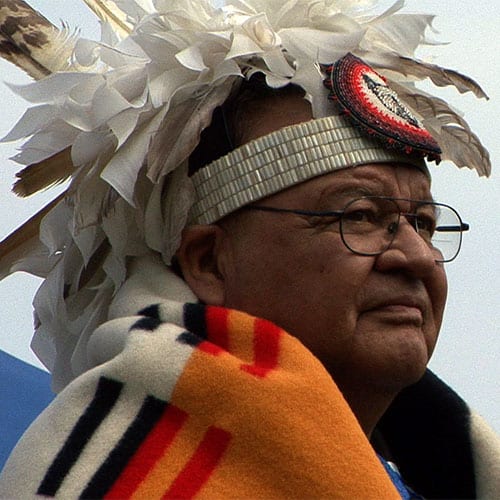
Jake Swamp
Jake Swamp was Wolf Clan sub-chief of the Kahniakehaka (People of the Flint), Mohawk Nation. For more than thirty years Chief Swamp was a Mohawk sub-Chief and representative on the Grand Council of the Haudenosaunee, Iroquois Confederacy: Mohawk, Oneida, Onondaga, Cayuga, Seneca, Tuscarora.
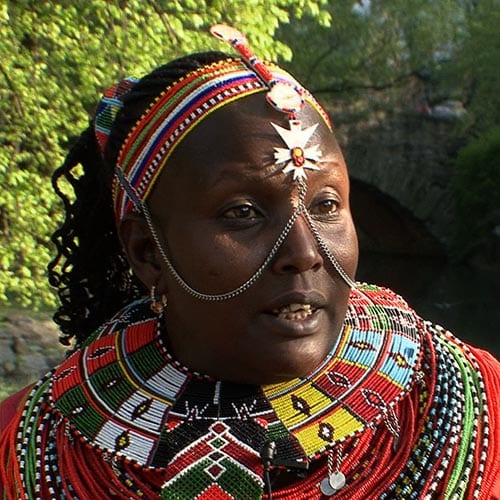
Christiana Saiti Louwa
Christiana Saiti Louwa is an El-Molo leader from Kenya, and head of a women’s cooperative. El-Molo is the smallest tribe in Kenya.
Marcos Terena
Marcos Terena is from the Terena, or Xané, people from the Pantanal region in Mato Groso do Sul, Brazil. Marcos has played an important role in the movement for indigenous peoples’ rights, both in Brazil and in the international political arena. He founded the first indigenous peoples’ rights movement in Brazil, the Union of Indigenous Nations, in 1977. In 1992 he organized the historic World Conference of Indigenous Peoples on Territories, Environment and Development. Marcos is a founding member of the Inter-Tribal Committee, the International Alliance of Indigenous Tribal Peoples of the Tropical Forests and the Brazilian Indigenous Institute on Intellectual Property.
Brian Keane
Brian Keane is the Co-Founder and Director of Land is Life, an international network of indigenous communities and organizations with a long history of significant achievements in the worldwide struggle for indigenous peoples’ rights. Keane has been active for 20 years in efforts to improve indigenous access to international policy-making processes; preserve threatened ecosystems; protect the human rights of indigenous peoples; and help indigenous communities to preserve their lifeways, maintain their sacred traditions, speak their own languages and continue caring for their ancestral homelands.
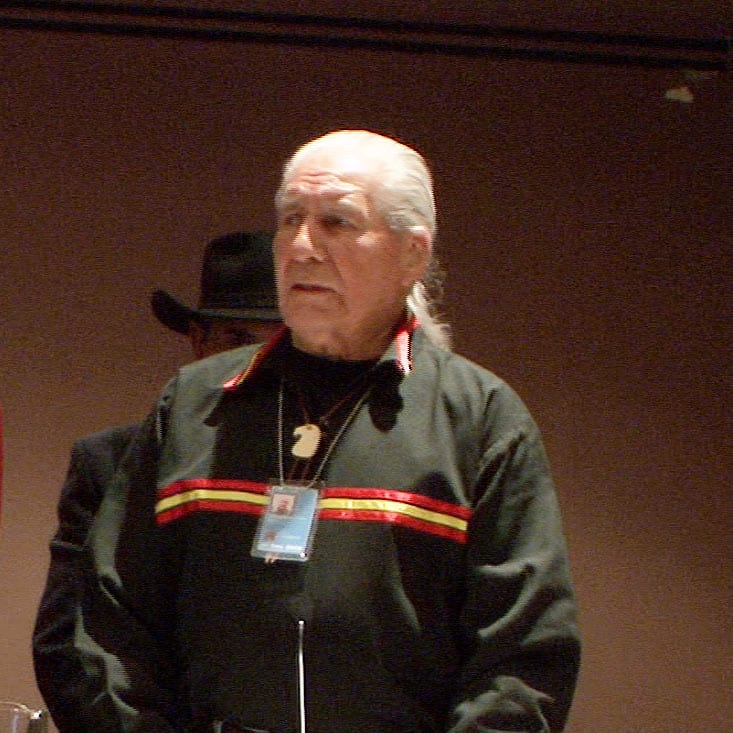
Oren Lyons
Oren Lyons is a traditional Faithkeeper of the turtle Clan and a proud and accomplished Native American who works tirelessly towards the issues concerning indigenous peoples in the United States and the world. He is a member of the Seneca Nation and of the Six Nations of the Iroquois Confederacy (Haudenosaunee), consisting of Seneca, Cayuga, Onondaga, Oneida, Mohawk and the Tuscarora Indian reservations in Upstate New York state. He is deeply involved with national and international issues that affect native peoples and has represented them in many forums throughout the world, including several at the UN focusing on the rights and status of indigenous peoples, the environment and sustainable development.
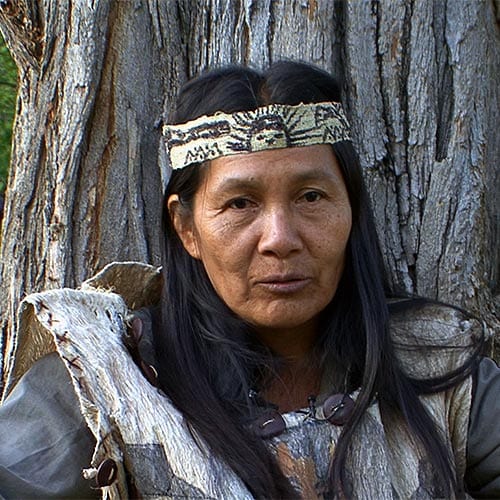
Gloria Ushigua
Gloria Ushigua is a shaman and leader of the Zapara people who live in Ecuador and Peru. Until a few years ago, the Zapara were thought to have been extinct. Starting with the rubber boom in the early nineteenth century, the Zapara have experienced a history of slavery, massacres and sickness that has reduced their population from 20,000 to 350 (approximately 200 in Ecuador and 150 in Peru). The Zapara are now fighting to preserve their culture, language and traditional knowledge, and to have their lands legalized and demarcated. Their lands and culture are currently threatened by oil development.
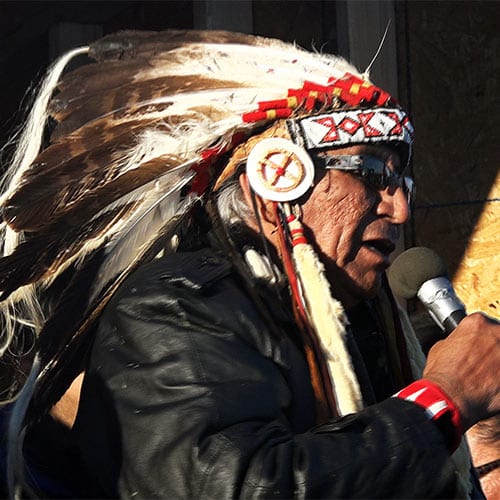
Arvol Looking Horse
Arvol Looking Horse was born on the Cheyenne River Reservation in South Dakota in 1954. Raised by his Grandparents Lucy and Thomas Looking Horse, he learned the culture and spiritual ways of the Lakota. He speaks both Lakota and English. At age twelve, he was given the enormous responsibility of becoming the 19th generation Keeper of the Sacred White Buffalo Calf Pipe, the youngest in history. He was raised in an era that gave witness to the suppression of his peoples’ spiritual practices. He decided to “work for change and let the world know how beautiful our way of life is, so the Seventh Generation can have a better life.” His life has revolved around his commitment to work towards religious freedom, cultural survival and revival.
Viktor Kaisiepo
Viktor Kaisiepo is from the Biak people of West Papua (ruled by Indonesia), living in exile in Holland. Viktor represents the Papua Traditional Council, which represents over 1 million indigenous West Papuans.
Tomas Alarcon
Tomas Alarcon is an Aymara from the Andes in Peru. He is a lawyer, and director of CAPAJ, an organization that works for the rights of the Aymara people in Peru and Bolivia. Tomas has been participating in United Nations conferences and meetings for over twenty years.
David Archambault II
David Archambault II (Lakota: Tokala Ohitika) is the tribal Chairman of the Standing Rock Indian Reservation in North Dakota. A graduate of North Dakota State University, with a master’s from the University of Mary, he had education in business and management. In 2016 and 2017, Archambault has spoken on behalf of the Standing Rock Tribe and allied people’s protests against the Dakota Access Pipeline. He has written editorials for The New York Times, and has spoken on Indigenous rights before the United Nations Human Rights Council.
Philis Young
Philis Young has served four years on the Standing Rock tribal council where her life struggle has been to protect the water. She grew up on this river. She was removed and displaced when she was 10 years old, and has never been compensated for the home that her grandparents lost. She came back and lives again on the river and has been on a campaign for life. Her life’s work is to maintain the river where she has lived, under international principles of treaty that govern our tribes relationship with the United States.
Share Your Thoughts
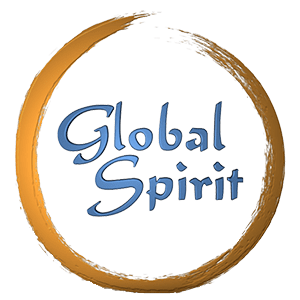


0 Comments